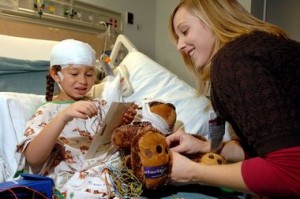Coping with Traumatic Brain Injuries
Children with a traumatic brain injury (TBI) typically experience a wide range of symptoms that can evolve over time. Some of the speech and language issues that your child might have trouble with include finding the right words, producing the correct sounds, and organizing information. Work with your child’s recovery team to develop a treatment plan and learn about coping methods. Your child’s recovery team will likely include his doctor, neuropsychologist, occupational therapist, and speech-language pathologist (SLP).
The SLP will evaluate your child’s speech and language difficulties and teach you methods of facilitating communication with your child. Your child might not be ready to run off to Toastmasters and become the next big keynote speaker right off the bat, but with a lot of work and patience, you can look forward to watching your little guy improve.
Your Child’s Environment
A child with a TBI may be confused about where he is and what has happened. Depending on the injury, he may also be confused about who you are. He might be especially disoriented in the hospital because it is an unfamiliar environment. Gently remind him of where he is and what has happened. Reassure him that he is safe and if necessary, remind him of who you are.
Arrange his environment to project a calm, peaceful atmosphere. This applies to his hospital room as well as your home after he is released. Reduce any clutter around him. Keep audiovisual stimulations to a minimum (i.e. TV and radio). As your child recovers and gradually begins to participate in his normal activities, keep him on a predictable routine. If he can read, write down his schedule for him so that he knows what to expect. If he cannot yet read, your child might benefit from a pictorial schedule. For example, tell him, “Aaron, today we’re going to see your doctor,” while holding up a drawing of his doctor or the hospital. These alterations to your child’s environment, whether tangible or intangible, can help prevent him from feeling overwhelmed.
Communication Tips
Your child will likely need some extra time to process what you are saying to him. Allow him plenty of time to respond to you. If he appears to be struggling to find the right words, try to provide him with verbal or visual cues. For example, if you notice that your child is looking toward the juice box on the table, say “juice box” to prompt him or hold the item up for him to look at.
Use short, simple sentences to communicate with your child and speak slowly, articulating each word carefully. Avoid asking him questions, unless your child’s SLP encourages you to do so. Say, “Let’s put on your blue sweater,” instead of asking, “Would you like to wear your blue sweater or the red shirt?” Giving your child a heads-up about what you’re going to do next is also beneficial for him. For example, before you wipe his face with a washcloth, tell him that you’re going to do so. Then, allow him time to respond before you wipe his face.
Your child may also have problems following directions, particularly if they are complex. Break the directions down into the simplest steps possible. Repeat each step several times. If your child still has trouble, he may require nonverbal instructions. Your child’s SLP might recommend writing down the directions for him, if he can read, or using a series of simple drawings. The SLP might also recommend using the Picture Exchange Communication System (PECS), which is a system of simple picture boards for communication.
School
When your child returns to school, meet with his teachers to discuss his communication issues. His teachers may need to provide verbal and nonverbal directions for assignments, as well as allow him additional time to respond. They may also need to move him to the front of the class to reduce distractions. Some children may also have trouble with abstract language after a traumatic brain injury. Inform his teachers that he may not understand certain types of language, like humor, sarcasm, and idioms.





